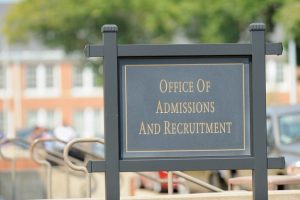The College Admissions Scandal Shows How Broken The System Is And Why No One Is Willing To Make Changes
Is anyone willing to fix this? Or will the status quo remain the same forever?

(Image via Getty)
The outrage of the week is the college admissions scandal. The timing and the cast of characters couldn’t be better. Right now, admissions officers are deciding who to admit and applicants are crossing their fingers hoping to be accepted to the college of their parents’ expectations. And the public gets a kick out of seeing the wealthy and celebrities fall from their elite, privileged towers.
In a nutshell, wealthy and influential parents paid a fixer insane amounts of money to get their children into elite colleges. The fixer used the money to bribe college coaches, test takers, and proctors to falsify test scores and athletic achievements. When the fixer got caught, he pleaded guilty and rolled over on the parents faster than you can say Michael Cohen.

Luxury, Lies, And A $10 Million Embezzlement
Of course, the news of the wealthy being able to buy their children into college shouldn’t be a surprise to anyone. We’ve grudgingly accepted it. Some even thought it might be a net benefit. For example, I have heard that it is a form of wealth redistribution. The money they give can be used to improve the school’s academic programs and fund scholarships for those from modest backgrounds. Others say that the wealthy can connect with young visionaries and intellectuals. They can combine their resources to start up various innovative or socially beneficial projects. And others say that the inclusion of privileged children adds to a university’s diversity. After all, the life experiences of someone who grew up with a silver spoon is just as insightful as someone who grew up with no spoon at all, isn’t it?
For the last few days, every news editorial, blog post, and tweet is calling for admissions reform. I’ve heard a variety of proposals but the most common demand is to strengthen affirmative action. And what is the right solution? That depends. The solution for most people tends to be the one that benefits them, their children, their ethnicity, or their tribe. So I don’t see a consensus happening anytime soon.
Being accepted to and graduating from elite universities opens career and social opportunities that are not available to others. To maintain this exclusiveness for employers and graduate school admissions officers, schools keep admission spots scarce despite having billions of dollars in endowments. This is why parents are hiring an army of tutors, “donating” vast sums of money, blatantly cheating, or filing lawsuits instead of taking their children and their tuition dollars elsewhere.
These schools know this and thus have no incentive to change the status quo. Sure, they will publicly condemn what happened, do an “investigation,” and maybe even expel a few people who were troublemakers anyway. But in the end, most schools won’t do anything except wait until this blows over. And any proposed solutions are likely to be intentionally vague with many loopholes. Like using “holistic” reviews or questionable “personality scores” when evaluating applicants. You see, this scandal, while embarrassing in the short term, is really free publicity for them because everyone still wants to attend these schools despite their questionable admissions practices.
Sponsored

AI Presents Both Opportunities And Risks For Lawyers. Are You Prepared?

Ranking The Law Firms Lawyers Love

Curbing Client And Talent Loss With Productivity Tech

AI Presents Both Opportunities And Risks For Lawyers. Are You Prepared?
Applicants are not going to attend a different, and possibly a less selective, school to protest this scandal because the cost to them is far greater than the principle. Even if they did, they won’t be missed because there are many others who will gladly take their place. And good luck getting their parents to agree with them. Most will choose to attend, promising that they will effect change from the inside, either as a student or as someone with influence in the future. We’ve heard this line time and time again, yet things don’t really seem to change.
Employers recruiting at these schools — mostly Fortune 500 companies and top government agencies — probably won’t do much either. Most of them (and their clients) are brand conscious. And this scandal does not change the fact that the vast majority of graduates of elite schools are talented and deserved to attend. It’s just easier for them to judge a person’s potential based on their educational pedigree. And the corporate travel budget does not allow them to recruit at every school in the country.
The college admissions scandal exposed an open secret where the wealthy can guarantee admission to their children at the right price. While this is clearly unfair, the solution isn’t as simple as it seems. All of the major actors — the schools, students, and employers — have no incentive to change their behavior or risk negatively affecting their future. Whatever the solution is, it is not going to please everyone. Perhaps these rich parents should get together, pool their millions, and use it to overhaul our educational system from the ground up so that it benefits their children and others.
Steven Chung is a tax attorney in Los Angeles, California. He helps people with basic tax planning and resolve tax disputes. He is also sympathetic to people with large student loans. He can be reached via email at [email protected]. Or you can connect with him on Twitter (@stevenchung) and connect with him on LinkedIn.
Sponsored

Law Firm Business Development Is More Than Relationship Building








